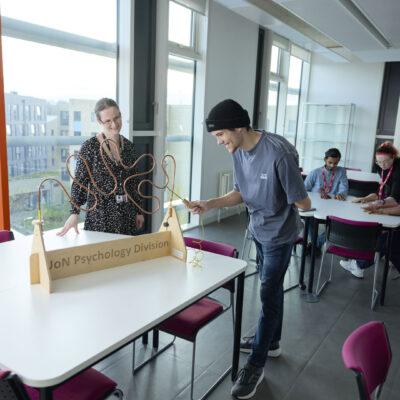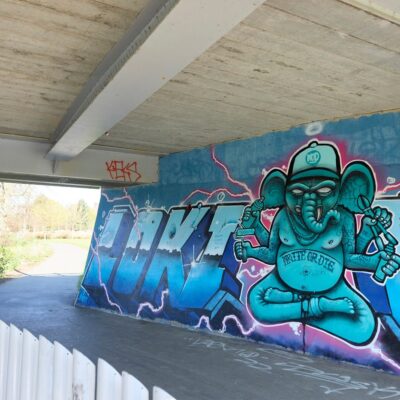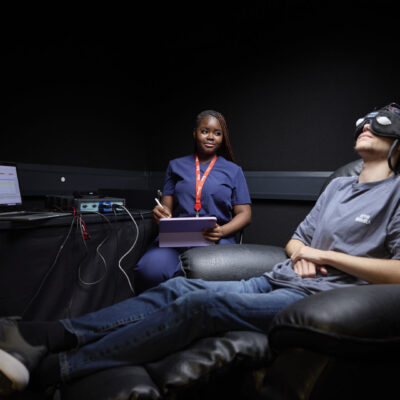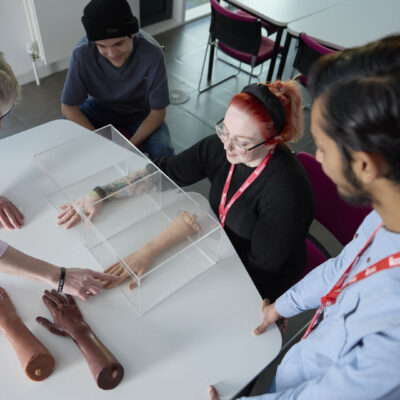Professor of Sociology
Faculty of Health, Education and Society

Sociology BA (Hons)
- Home
- Courses by subject
- Sociology BA (Hons)
Key Facts
-
UCAS Code
3 year: L300
Foundation: L301 -
Level
UndergraduateUG BA (Hons)
-
Duration
3 years full-time
4-6 years part-time
4 years full time (Integrated Foundation Year) -
Starting
September
-
BCC at A Level
DMM at BTEC -
Full Time: £9,535
Part Time: £1,585 per 20 credit module
Integrated Foundation Year: £5,760 -
Full Time: £15,700
Integrated Foundation Year: £15,700 -
Waterside
Updated 27/03/2025
Updated 27/03/2025
Get in touch
For questions regarding study and admissions please contact us:
UK STUDENTS ENQUIRIES
study@northampton.ac.uk
0300 303 2772
INTERNATIONAL STUDENTS ENQUIRIES
We live in unprecedented eventful times of intense, rapid and constant social transformation – from rising economic inequality/poverty, the climate crises, threats to liberal democracy, the impact of social media, the recognition of LGTBQ+, BLM and disability groups, to name just a few – creating an increasingly complex world of both progress and peril that sociologists are best equipped to address. So, if you are excited by contemporary questions and convincing explanations about the world around you, then studying a degree in Sociology is for you.
The University of Northampton’s Sociology team has the necessary high quality teaching and research experience to provide you with the sociological knowledge, skill and confidence to succeed in higher education. You will have the opportunity to study a diverse range of interdisciplinary topics, from identity/self, inequality/injustice, education, media/culture, crime/deviance, love/body, work/volunteering, health/wellbeing, utopianism/future, environment, and death – and actively engage with these pressing real-world contemporary issues head on. BA Sociology teaching is made up of active blended learning in and around the classroom via small group work with a diverse student body and individualised assessment types, and through research/reflection out in the field on placements and our highly subsidised international field trip. On the BA Sociology degree, you will acquire employability skills required to achieve not only personal graduate success in in a wide range of career pathways in the public, private or third sectors, but also positive social change to benefit the public good, tailoring your ‘sociological imagination’ to something that you are interested in and care about.
Highlights
- Teaching staff with extensive and recognised academic, research and professional practice experience.
- Excellent staff/student relations and supportive approach to teaching/learning.
- Small group, interactive and experiential teaching approaches adopted using a blend of face to face and online delivery to ensure student learning is social, inclusive and engaging
- Increasing individualised assessment topic choice within substantive module areas across your 3 years of study.
- Sociology BA has excellent NSS/student satisfaction results.
- Substantially funded international field trip opportunity.
- Employability focus through optional work, volunteering or social action placement and optional placement year.
- Optional work placement year between stages 2 and 3
- Broad range of career options and highly transferable graduate employability skills.
- Option to study the course as a part time sociology degree.
- Integrated Foundation Year available.
- Guaranteed paid internship with the Northampton Employment Promise.
- HP laptop and software included with this degree in sociology for eligible students.* (*see eligibility criteria and terms and conditions).
Entry Requirements
A typical offer to study BA Sociology at the University of Northampton would be:
- BCC at A Level or
- DMM at BTEC/Cambridge Technical or
- an Access Course which must include 30 level 3 credits at Merit or
- Pass (C and above) at T Level
We welcome applications from students with a mix of A levels and BTEC/Cambridge Technical qualifications.
We welcome international applicants and applications from those with a range of non-traditional educational or professional qualifications.
-
Admission to the Foundation Framework for the degree in sociology is normally:
- DEE at A Level or
- MPP at BTEC/Cambridge Technical or
- Pass (D or E) at T Level
We welcome applications from students with a mix of A levels and BTEC/Cambridge Technical qualifications.
However, we would also like to hear from you if you have professional or industry experience instead, a range of other qualifications or self-developed subject knowledge that relates to the course you wish to study.
-
All International and EU students applying for a course with us must meet the following minimum English language requirements:
- IELTS 6.0 (or equivalent) with a minimum of 5.5 in all bands
for study at undergraduate level.
For information regarding English language requirements at the University, please see our IELTS page.
- IELTS 6.0 (or equivalent) with a minimum of 5.5 in all bands
International Field Trip
As sociologists, we value the significance of understanding different societies/cultures to our own, and for that reason, there is an exciting opportunity in the second year to participate in an international field trip, allowing you to learn about how different societies/cultures function, and apply your sociological knowledge and understanding to real-life in-the-field scenarios.
In the past, students have travelled to New York, Abu Dhabi, Berlin, Athens, Rome, a ‘Brexit Tour of Europe’, and Istanbul. Each year we work together to decide on a unique destination, dependent on interest, opportunity, distance, risk and cost.
The field trip is optional. For a five-to-seven-day visit, the cost of the trip will be no more than £1,000 (that includes flights, hotel – usually bed and breakfast – and airport transfers), for which you will be asked to contribute a small amount (usually around £150 + additional spending money for extra costs).
Course Content
-
This sociology university course has been designed to contribute towards achieving the following United Nations Sustainable Development Goals: SDG5 Gender Equality; SDG10 Reduce Inequalities and SDG11 Sustainable Cities and Communities.
You will join a thriving university in general and a sociology specific learning community of academic and professional service staff, as well as a diverse range of students in a thriving interdisciplinary environment. The BA Sociology team are extremely passionate about sociology and the important role it functions for the world, on macro, meso and micro levels; we are highly motivated to inspire future generations who seek to make a difference to the world around them.
While studying the degree in sociology, you will apply your sociological imagination to learn new ways of critically understanding and discussing important contemporary questions/concerns from a many different social science perspectives and approaches, not just through the dominant Western – such as: How do humans shape and are shaped by the societies they live in? How do we shape our own identities? How does our physical environment influence our lives and societies? How are social inequalities represented in our culture and media? How can we understand race, ethnicity and migration after Brexit? How have ideas of love and intimacy changed throughout history? How do different ideas of the future influence our lives?
The BA Sociology degree programme is delivered in a semesterised format. In stage one, important core ideas, evidence and methods are introduced. This basic knowledge is built upon in stages two and three to foster an advanced understanding of increasingly specialised topics and allowing you to increasingly focus on individual areas of specific interest. For all three stages/years you will receive 12 hours per week of dedicated teaching support over two semesters (for the most part divided into three modules per semester, with three hours face-to-face and one hour online for each module), as well as additional staff, personal academic tutor and professional service support and guidance – although for your second and third years you will receive incrementally less compulsory class teaching time and more optional one-to-one support in your second semester when completing your research/reflection project and dissertation.
The BA Sociology degree programme can be taken as a full time or part time. If you are studying this course full-time, you will take 120 credits worth of modules for each stage for three years – totalling 360 credits overall. All modules are 20 credits (with the exception of the 40 credit dissertation module). Some modules are compulsory, whilst others are designated – so selected from a range of options.
Stage One
In your first year, core compulsory modules connect with previous teaching/learning to provide you with a foundation of knowledge and understanding in the discipline of Sociology, ensuring that you get to grips with key sociological issues, theories and concepts (even if you have never studied sociology before), to more than sufficiently prepare you for your future as a budding sociologist.
Stage Two
In the second year, you will have the chance to develop your knowledge further in various old/new areas of contemporary sociological and societal significance – with an increasing focus on individualised assessment topics where possible. One of the areas we focus on is the theory and practice of social research methods, with an opportunity to apply your social research and reflection skills, in a variety of settings in the field, focused on a topic of sociological and societal interest to you.
Stage Three
In your final year, you will have the opportunity to explore more complex sociological theories and concepts, in various old/new areas of contemporary and future sociological and societal significance – with even more of focus on individualised assessment topics where possible. In addition, you will also have the chance to research and investigate an important sociological and societal topic of your choice in greater detail, and expert dissertation supervisors (who you meet regularly) support you in the process.
Please note the modules shown here relate to the academic year 24/25. The modules relating to the academic year 25/26 will be available from June 2025.
-
In your first year, core compulsory modules connect with previous teaching/learning to provide you with a foundation of knowledge and understanding in the discipline of Sociology, ensuring that you get to grips with key sociological issues, theories and concepts (even if you have never studied sociology before), to more than sufficiently prepare you for your future as a budding sociologist.
-
The Sociology of Education (20 Credits)
Module code: SOC1069Status: CompulsoryThe module aims to support students in developing a theoretical/conceptual and historical understanding of the social issues surrounding education. The module supports these aims by: (1) providing a solid grounding in key sociological theories and themes vis-a-vis education, (2) exploring core themes for sociology of education, for instance the role of the State, the concept of childhood, the relationship between education and the market and education and the family, and (3) giving opportunities to develop the skills to evaluate and instigate change in educational systems
-
Media, Crime and Society (20 Credits)
Module code: SOC1072Status: CompulsoryDrawing on from disciplines such as Sociology, Media/Cultural/Communication Studies, Journalism, Criminology and Psychology, this module is designed to introduce students to a wide range of different topics in order to create a multi/inter-disciplinary theoretical and conceptual understanding of the relationship between the media, crime and society.
-
Spaces and Places of Social Inequalities (20 Credits)
Module code: SOC1077Status: CompulsoryCurrent sociological research on inequalities focuses on the geography of social inequality, that is, on the relation between space, place and inequalities. This module explores issues such as housing, health services, education polices, urban and rural development, supporting the students in gaining an understanding of several core areas of social and spatial inequalities.
-
The Sociological Imagination (20 Credits)
Module code: SOC1078Status: CompulsoryThe purpose of this module is to introduce in a critical and synthesized manner that enable first-year sociology students to understand how sociology investigates and describes the social world. Important theoretical perspectives and primary methodological considerations will be a large consideration. Empirical as well as theoretical engagement with introductory sociological principles will be presented as part of the wider concept of what is perceived to be the `sociological imagination?.
-
The Sociology of Love and Intimacy in the 21st Century (20 Credits)
Module code: SOC1080Status: CompulsoryThis module allows students to tackle a range of material within a specialist field. It enables students to relate the study of intimate relationships and family life to their own experience whilst developing their ability to apply sociological research and theories to understanding this area.
-
Identity and Social Change (20 Credits)
Module code: SOC1081Status: CompulsoryThis module will introduce students to a range of micro- and macro-sociological perspectives and their analysis of the changing nature of social identities. It aims to demonstrate the relevance and applicability of sociology to an understanding of social identity and aspects of everyday life.
-
The Sociology of Education (20 Credits)
-
In the second year, you will have the chance to develop your knowledge further in various old and new areas of contemporary sociological and societal significance – with an increasing focus on individualised assessment topics where possible. A primary focus is on the theory and practice of social research methods, with an opportunity to apply your social research and reflection skills, in a variety of settings in the field, focused on a topic of sociological and societal interest to you.
-
Methodology and Application in Social Research (20 Credits)
Module code: SOC2112Status: CompulsoryThe purpose of this module is to familiarise students with the theoretical and practical elements of the social research process which will help in preparation for their dissertations in the third year and in any future research and project evaluation.
-
`Race', Ethnicity and Migrations (20 Credits)
Module code: SOC2113Status: DesignateTo provide a framework through which students can develop an understanding of racial inequalities through historical and contemporary social science perspectives. Students will explore fundamental theories of 'race' and ethnicity as well as identity theories, colonialism, migration, intersectional theories as well as black feminist thought.
-
Sociology of Health and Well-being (20 Credits)
Module code: SOC2114Status: DesignateThis module introduces students to: a range of sociological perspectives and contemporary debates relating to the Sociology of Health and Well-Being; issues and/or practice; the socially constructed nature of medical knowledge and practice; relationships between, and explanations for, social variances in health, illness, disease and well-being and globalisation; the classic sociological `structure? versus `agency? debates.
-
Sociological Research & Reflection in Action (20 Credits)
Module code: SOC2116Status: CompulsoryThe purpose of this module is for students to develop and showcase their employability and practical sociological research and/or reflection skills, in order to engender personal self-development and positive societal change, to better prepare them to complete a dissertation and for graduate success.
-
Culture, Representation and Social Inequalities (20 Credits)
Module code: SOC2118Status: DesignateThis module introduces students to core debates, concepts and theories of culture and representation, with a focus on the representation of social inequalities. Through the examination of a range of contemporary media examples, students also learn to use and apply key approaches to media and cultural analysis.
-
Sexual Intimacy and the Body (20 Credits)
Module code: SOC2119Status: DesignatePopular and academic concern with both the body and sex have increased enormously within the last 150 years. This module provides an opportunity to explore this development in relation to matters of continuity and change within advancing modernity at a range of levels from the individual to the global.
-
Social and Cultural Transformations (20 Credits)
Module code: SOC2120Status: DesignateThe purpose of this module is to develop student?s theoretical and conceptual knowledge and understanding about major social and cultural contextual changes over time.
-
Methodology and Application in Social Research (20 Credits)
-
In your final year of the sociology degree, you will have the opportunity to explore more complex sociological theories and concepts, in various old/new areas of contemporary and future sociological and societal significance – with even more of focus on individualised assessment topics where possible. In addition, you will also have the chance to research and investigate an important sociological and societal topic of your choice in greater detail, and expert dissertation supervisors (who you meet regularly) support you in the process.
-
Sociology of the Self (20 Credits)
Module code: SOC3059Status: DesignateThe purpose of this module is ?to advance students? understanding concerning: a) the socio-theoretical approaches to the study of the self and b) the dialogic relationship between them. It provides students with the means to understand core theorizations of the relationship between society and the individual and consider possible distinctions of the two concepts. It will also enable students to understand the distinction between inter-active and intra-active processes as two of the key ways to explore the relationship between structure and agency.
-
Sociology of Death (20 Credits)
Module code: SOC3060Status: DesignateThis is a level 6 module that builds on the sociological foundations of level 5 and allows students to tackle a range of material within a specialist field. The module has been designed to enable students to relate the study of death, dying and breavement to their own experience whilst also developing their ability to apply sociological research and theories to the understanding of this area.
-
The Sociology of the Future (20 Credits)
Module code: SOC3063Status: DesignateThe purpose of this module is to engage in a critical interdisciplinary examination of past and present examples of possible, probable, preferable and already in process futures. Students will critically explore how the future has been/is told, tamed, traded, transformed, traversed, thought, tended and transcended ? focusing on the 'utopian imagination' i.e. the hope for a more perfect world and better 'way of life? that has always been at the very core of the 'human condition' and which had/still has an important part to play in re-shaping contemporary ideologies, peoples and societies.
-
Sexuality, Gender and Power (20 Credits)
Module code: SOC3064Status: DesignateThe purpose of this module is to explore key theories and concepts of gender and sexuality, from intersectionality and representation to power, performativity and queer theory. Students learn to apply gender and sexuality theories to key areas of sociological and social scientific investigation of inequalities, identities, culture and politics.
-
Environment and Sustainability (20 Credits)
Module code: SOC3065Status: DesignateThe purpose of this module is to provide students with a comprehensive understanding of environmental and sustainability issues, as well as the knowledge and skills needed to enhance work on the resolution/advancement of environmental and sustainability issues.
-
Sociology Dissertation (40 Credits)
Module code: SOC4018Status: CompulsoryThe purpose of this module is to build on the applied social research methods training that students receive at Level 5 and provide them with an opportunity to study a topic of contemporary sociological significance in depth. Students are expected to work independently, under the supervision of their dissertation supervisor.
-
Sociology of the Self (20 Credits)
-
-
At the University of Northampton, everything we do, from funded trips to paid internships, is to give you everything you need to make a difference when you leave.
If you join this full time degree in sociology at the University of Northampton, you will receive a laptop when your course begins*. The laptops are built to a bespoke custom specification ideal for use in the seminar room, collaborative group work or studying at home.
Whatever your ambitions, we’re here to help you to achieve them. We’ll support you to identify the skills you’re learning during your sociology course, find your strengths and secure practical experience so that when it comes to applying for jobs or further study you’ll feel confident in standing out from the crowd. We’ve created the Northampton Employment Promise because we are so confident that if you focus on your studies and complete one of our awards you’ll be highly employable by the time you graduate. Putting you in a great position to secure employment or continue your studies.
To check out the full list of perks, visit our Student Perks page or dedicated International Perks page.
* UK fee payers only (see Terms and Conditions for further details)
-
The Integrated Foundation Year (IFY) offers a new and exciting route into studying for a degree in Sociology, attracting ambitious and driven students who are willing to learn and advance.
If you have non-standard qualifications or do not quite meet the admissions requirements for the degree in sociology, we can offer you a fantastic opportunity to study a four year programme which includes an Integrated Foundation Year. The Integrated Foundation Year will help you develop the theoretical/practical and academic skills you need, in order to successfully progress to the full award.
Our four-year courses will enable you to successfully follow the degree pathway of your choice while gaining essential study skills. The foundation year of your chosen degree will be studied on a full-time basis and is aimed at supporting the transition to higher education. Years two, three and four are then studied as a standard degree programme.
-
How will I learn on the BA Sociology degree?
Our approach to teaching and learning on this sociology degree combines face-to-face teaching with carefully crafted digital experiences*, designed to help you take control of your own learning. Typically, you will study in small, interactive group sessions, where you learn through interactive, teamwork and problem-solving activities, and have a range of online resources and materials at your fingertips.
How will I be assessed?
The assessments on the BA Sociology university course are regularly praised by our external examiners as being imaginative and varied. Assessment methods used on this course include:
- essays
- portfolios
- case studies
- journal articles
- seen and unseen exams
- group and individual presentations
- research projects
- posters and pamphlets.
Worried about student finance?
Get all the info you need ahead of time, before you can apply for funding in Spring on our fees and funding pages.
Fees and Funding
2025/26 Tuition Fees
- UK Full Time: £9,535
- UK Part Time: £1,585 per 20 credit module
- UK Integrated Foundation Year: £5,760 for the foundation year; thereafter standard fees apply
- International Full Time: £15,700
- International Integrated Foundation Year: £15,700 for the foundation year; thereafter standard fees apply
Fees quoted relate to study in the Academic Year 2025/26 only and may be subject to inflationary increases in future years. UON will adjust UK fees annually in line with Government Policy.
-
The optional International Field Trip* is partially funded by the University. The cost of trip is on average between £600-£1,000 and students pay part of this cost.
As a part of the placement, students get a free DBS paid by the University (where required), but students need to pay for any additional expenses such as travel costs.
-
For information on the scholarships available to you, please see our scholarships page.
For more information about possible funding options, please visit our Fees and Funding pages.
-
Fees quoted relate to study BA Sociology in the Academic Year 24/25 only. They may be subject to inflationary increases in future years.
- UK – Full Time: £9,250
- UK – Part Time: £1,540 per 20 credit module
- UK – Integrated Foundation Year (IFY): £9,250 as part of a four year programme (subsequent years will be charged at standard BA/BSc rate).
- International – Full Time: £15,200
- International – Integrated Foundation Year (IFY): £15,200
Staff
Careers and Employability
The University of Northampton places an important emphasis on supporting you in achieving your graduate career and/or postgraduate study ambitions, by providing lots of opportunities to experience the world of work.
Employability skills are built into the Sociology degree programme throughout the three years, so that you are consistently building the skills that you will need to prepare for the world of work.
As well as the placement opportunity in your second year, you have the opportunity to complete an optional year-long work placement in between Stages 2 and 3 of study. If you choose to take a placement year, you will spend a whole year (up to 48 weeks) working in an area/organisation of interest to you, in the UK or overseas. The Student Futures team offer a lot of support in helping you to find a placement. This invaluable experience helps you to apply your learning in your final year (including your dissertation) and prepares you for your future graduate career.
What can you do with a sociology degree?
Our BA Sociology degree students have ended up with careers in fields ranging from education, youth work, charities and community organisations, to PR and marketing, media and journalism, HR and management, as well as social work, politics, and social research – to name just a few. The advantage of doing a sociology degree is that it prepares you for many different graduate careers, in an increasingly uncertain world.

Related Courses

Psychology BSc (Hons)
The Psychology course is embedded within a highly flexible modular system, enabling you to choose modules...

Criminology BA (Hons)
Studying Criminology with us gives you a distinctive approach to learning, drawing on the disciplines of...

Politics and International Relations BA (Hons)
This course provides you with an excellent grounding for careers across the public, private and voluntary...

Psychology (Counselling) BSc (Hons)
If you want to become a counsellor, counselling psychologist or develop transferable counselling skills, this course...

Psychology (Developmental and Educational) BSc (Hons)
Our Developmental and Educational course is a specialist psychology programme that allows you to focus on...

Forensic Psychology BSc (Hons)
Understand how psychological knowledge informs forensic practice and gain hands-on experience of conducting scientific research on...




